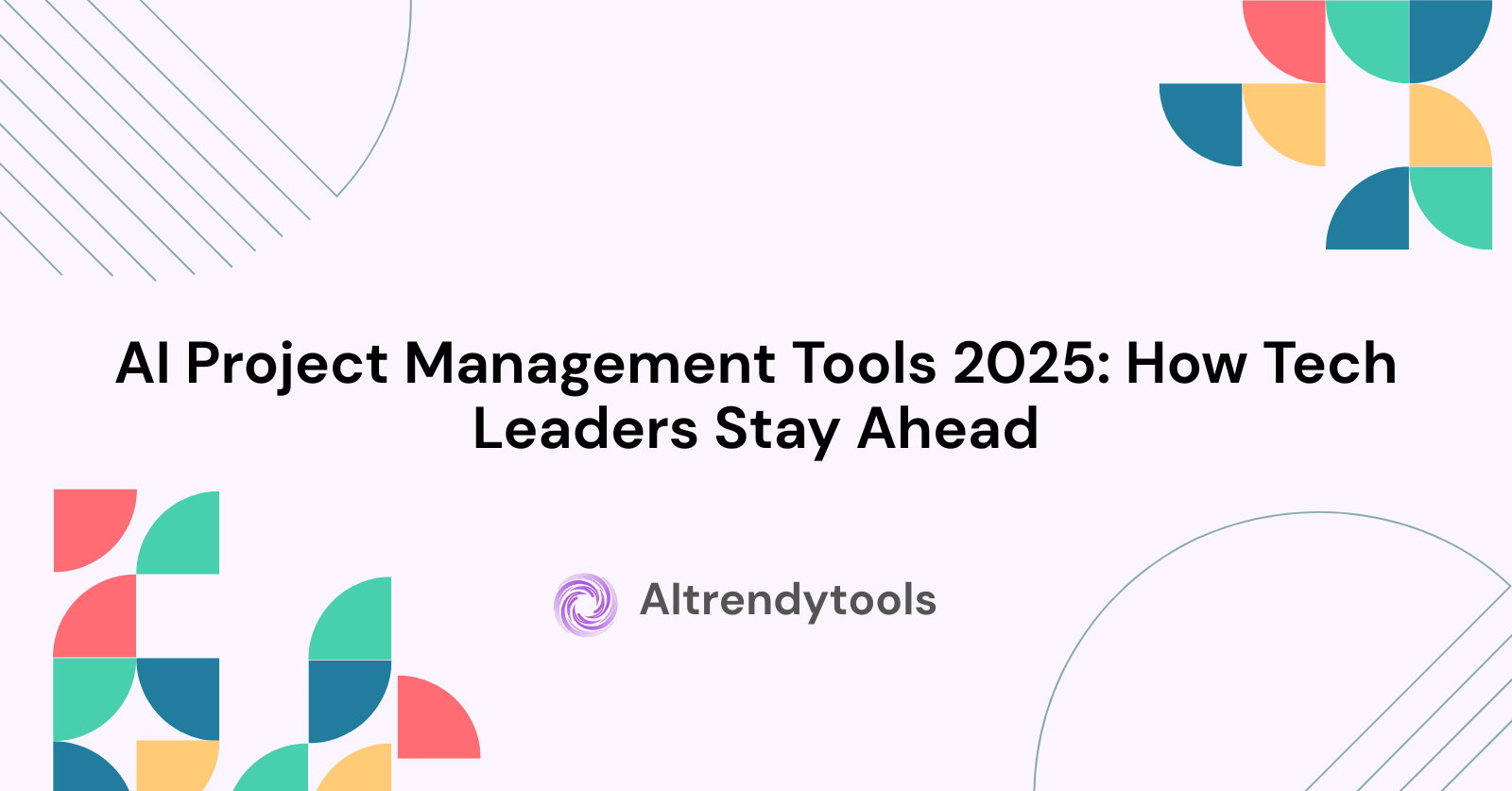🔥 AITrendytools: The Fastest-Growing AI Platform |
Write for usAI Project Management Tools 2025: How Tech Leaders Stay Ahead
Discover how AI-powered project management transforms workflows, boosts team productivity, and helps tech leaders deliver projects 40% faster in 2025.
Jan 21, 2026
The project management landscape has undergone a revolutionary transformation. Tech leaders worldwide are discovering that traditional project management approaches no longer meet the demands of today's fast-paced digital environment. With the AI in project management market projected to grow from $3.08 billion in 2024 to $3.58 billion in 2025, at a Compound Annual Growth Rate (CAGR) of 16.3%, artificial intelligence has emerged as the game-changing solution that separates industry leaders from their competition.
Modern tech teams face unprecedented challenges. Projects span multiple time zones, involve diverse skill sets, and require real-time adaptation to changing requirements. As of 2023, 21% of project managers report using AI in their work, and a staggering 91% believe it will have at least a moderate impact on the profession in the next five years. The question is no longer whether AI will transform project management, but how quickly organizations can adapt to stay competitive.
The Evolution of AI in Project Management
Traditional project management relied heavily on manual processes, spreadsheets, and reactive problem-solving. Project managers spent countless hours on administrative tasks, leaving little time for strategic thinking and team leadership. This approach created bottlenecks and increased the risk of delays, budget overruns, and missed opportunities.
AI-powered project management represents a paradigm shift from reactive to predictive management. Rather than replacing the project manager, AI acts as an invaluable partner, equipping teams with insights and foresight that help them achieve better outcomes faster. The technology transforms every aspect of project management, from initial planning to final delivery.
The numbers speak volumes about this transformation. Companies using AI tools have reported a 40% reduction in operational tasks, allowing them to spend 43% more time on revenue-focused activities. This has resulted in measurable outcomes such as 18 hours saved per sprint, $21,000 saved annually per team member, and 26 fewer meetings per month.
Machine Learning for Predictive Analytics
Predictive analytics powered by machine learning has revolutionized how tech leaders approach project forecasting. Gone are the days of relying solely on gut instinct and historical averages to estimate project timelines and resource requirements.
AI's predictive analytics are pivotal in project forecasting, allowing project managers to set realistic timelines, anticipate potential bottlenecks, and establish feasible budgets. Machine learning algorithms analyze vast datasets from previous projects, identifying patterns that human managers might miss.
Data-driven forecasting represents the cornerstone of modern project management. AI systems examine historical project data, team performance metrics, and external factors to generate highly accurate predictions. These predictions help tech leaders make informed decisions about resource allocation, timeline adjustments, and risk mitigation strategies.
Cost prediction through machine learning has eliminated many budget surprises that plagued traditional project management. Machine learning models analyze past project expenses to improve budgeting accuracy, minimizing the risk of cost overruns. Tech leaders can now present stakeholders with confident budget projections backed by data-driven insights.
Capacity planning has become more sophisticated with AI-powered tools. AI-powered tools offer insights into resource needs, ensuring that project managers allocate resources efficiently based on historical utilization data. This prevents team burnout and ensures optimal productivity across all project phases.
Intelligent Workflow Automation
Workflow automation represents one of the most immediate benefits of AI-powered project management. Tech leaders are discovering that intelligent automation eliminates repetitive tasks while maintaining quality and consistency across all project activities.
One of the most significant perks of AI in project management is its automation prowess. AI-powered tools efficiently handle repetitive tasks, freeing up you and your team to concentrate on strategic endeavours. This shift allows project managers to focus on high-value activities that require human creativity and decision-making skills.
Smart task scheduling has transformed how teams approach project timelines. AI algorithms consider multiple variables when scheduling tasks, including team member availability, skill sets, dependencies, and historical performance data. The result is optimized schedules that maximize productivity while preventing resource conflicts.
Automated progress tracking provides real-time visibility into project status without requiring manual updates from team members. AI systems monitor task completion, identify potential delays, and alert stakeholders to issues before they impact project timelines. This proactive approach prevents small problems from becoming major setbacks.
Dynamic resource allocation ensures that the right people work on the right tasks at the right time. AI systems analyze team member skills, current workload, and project priorities to make optimal resource assignments. This intelligent allocation improves quality while reducing project duration.
Real-Time Risk Assessment
Risk management has evolved from periodic reviews to continuous monitoring with AI-powered project management tools. Tech leaders now have unprecedented visibility into potential project risks and can take preventive action before issues escalate.
Real-time Insights: AI provides real-time insights so Project Managers can make informed, rapid, and precise decisions. This immediate access to actionable intelligence transforms how teams respond to challenges and opportunities.
Intelligent risk identification goes beyond traditional risk registers. AI systems analyze multiple data sources, including team communications, task completion rates, and external factors, to identify emerging risks. This comprehensive approach ensures that no potential threat goes unnoticed.
Predictive risk modeling helps tech leaders understand the potential impact of identified risks. AI algorithms calculate probability scores and potential consequences, allowing project managers to prioritize their attention and resources on the most critical threats.
Automated risk mitigation suggestions provide project managers with actionable recommendations for addressing identified risks. These suggestions are based on successful strategies used in similar situations, giving tech leaders proven approaches to risk management.
Smart Resource Optimization
Resource optimization has become a science rather than an art with AI-powered project management tools. Tech leaders can now make data-driven decisions about team composition, skill development, and workload distribution.
Cost Savings: Smart resource allocation, guided by AI project management tools, results in substantial cost savings. Project Managers can optimize resource planning with AI-driven decisions factoring in employee skills, project priorities, and budget restrictions. This optimization extends beyond immediate cost savings to long-term strategic advantages.
Skill gap analysis identifies areas where team members need additional training or where external expertise might be required. AI systems analyze project requirements against current team capabilities, highlighting gaps that could impact project success.
Dynamic team formation ensures optimal team composition for each project phase. AI algorithms consider personality traits, working styles, and past collaboration success to create high-performing teams. This intelligent matching reduces conflicts and improves team productivity.
Workload balancing prevents team member burnout while maximizing overall productivity. AI systems monitor individual workloads and redistribute tasks when necessary to maintain optimal performance levels across the entire team.
Automated Reporting and Insights
Traditional project reporting consumed significant time and often provided outdated information by the time stakeholders reviewed it. AI-powered reporting delivers real-time insights with minimal manual effort from project managers.
Executive dashboard automation provides stakeholders with up-to-date project information without requiring manual report generation. AI systems compile data from multiple sources and present it in easily digestible formats that support decision-making.
Performance trend analysis helps tech leaders identify patterns in team and project performance. AI systems track key metrics over time and highlight trends that might indicate emerging issues or opportunities for improvement.
Stakeholder communication optimization ensures that different audiences receive relevant information in appropriate formats. AI systems customize reports based on stakeholder roles and preferences, improving communication effectiveness while reducing report preparation time.
Predictive milestone alerts notify stakeholders about potential schedule changes before they occur. This proactive communication allows for better planning and reduces the impact of schedule adjustments on other business activities.
AI-Driven Team Collaboration
Modern project teams often work across different locations, time zones, and cultures. AI-powered collaboration tools help bridge these gaps and create cohesive team environments that support high performance.
Intelligent meeting scheduling considers multiple factors including time zones, individual preferences, and project priorities to find optimal meeting times. This reduces scheduling conflicts and ensures maximum participation in important discussions.
Automated meeting summaries capture key decisions, action items, and follow-up tasks from team meetings. AI systems generate accurate summaries and distribute them to relevant stakeholders, ensuring that nothing falls through the cracks.
Smart communication routing ensures that information reaches the right people at the right time. AI systems analyze message content and automatically route communications to appropriate team members, reducing information overload while ensuring critical messages are not missed.
Language translation capabilities enable seamless collaboration across global teams. AI-powered translation tools help team members communicate effectively regardless of their native language, breaking down barriers that could impact project success.
Advanced Decision Support Systems
Decision-making in complex projects involves weighing multiple variables and considering numerous potential outcomes. AI-powered decision support systems provide tech leaders with the information and analysis needed to make optimal choices.
Scenario modeling allows project managers to explore different approaches and their potential outcomes before committing to a specific course of action. AI systems can rapidly analyze multiple scenarios and present the pros and cons of each option.
Decision impact analysis helps tech leaders understand the broader implications of their choices. AI systems trace the potential effects of decisions across all project areas, highlighting unexpected consequences that might not be immediately obvious.
Recommendation engines suggest optimal approaches based on similar past situations and current project constraints. These AI-powered suggestions provide tech leaders with proven strategies for addressing common project challenges.
Data visualization tools present complex project information in formats that support quick comprehension and decision-making. AI systems automatically select the most appropriate visualization methods for different types of data and audiences.
Performance Analytics and Metrics
Measuring project performance has evolved far beyond simple schedule and budget tracking. AI-powered analytics provide deep insights into all aspects of project performance and team productivity.
Team productivity analysis identifies factors that contribute to high performance and areas where improvement is possible. AI systems analyze work patterns, collaboration effectiveness, and individual contributions to provide actionable insights for performance optimization.
Quality metrics automation tracks project deliverable quality without requiring extensive manual review. AI systems can assess code quality, document completeness, and other measurable quality factors, providing continuous feedback on project output.
Customer satisfaction prediction helps tech leaders anticipate client reactions to project deliverables. AI systems analyze past client feedback and current project characteristics to predict satisfaction levels and suggest improvements.
ROI calculation automation provides stakeholders with up-to-date information about project value and return on investment. AI systems track project costs and benefits in real-time, enabling better resource allocation decisions.
Future Trends in AI Project Management
The AI project management landscape continues to evolve rapidly, with new capabilities emerging regularly. Tech leaders who stay ahead of these trends will maintain their competitive advantage in an increasingly complex business environment.
The market for AI in project management is expected to grow from $3.08 billion in 2024 to $3.58 billion in 2025, at a Compound Annual Growth Rate (CAGR) of 16.3%. This growth indicates continued innovation and improvement in AI-powered project management tools.
Natural language processing capabilities are becoming more sophisticated, enabling more intuitive interaction with project management systems. Tech leaders will soon be able to manage projects using conversational interfaces that understand context and intent.
Integration with emerging technologies such as IoT sensors and augmented reality will provide new sources of project data and new ways to visualize project information. These integrations will enhance decision-making and team collaboration.
Autonomous project management capabilities are emerging, where AI systems can make routine project decisions without human intervention. While human oversight remains essential, these autonomous capabilities will free tech leaders to focus on strategic activities.
Best Practices for Implementation
Successfully implementing AI-powered project management requires careful planning and execution. Tech leaders who follow proven best practices will achieve better results and faster adoption across their teams.
Start with pilot projects that demonstrate clear value and build confidence in AI-powered approaches. Choose projects with well-defined success metrics and engaged stakeholders who can champion the new technology.
Invest in team training and change management to ensure successful adoption. Team members need to understand how AI tools enhance their work rather than replace their expertise.
Establish clear governance frameworks for AI-powered project management. Define roles, responsibilities, and decision-making processes that incorporate AI insights while maintaining human accountability.
Monitor and measure results continuously to demonstrate value and identify areas for improvement. Regular assessment ensures that AI implementations deliver expected benefits and guides future investments.
Conclusion
AI-powered project management has transformed from an emerging trend to an essential capability for tech leaders who want to stay ahead of their competition. The evidence is overwhelming: organizations that embrace AI-powered project management achieve better outcomes, reduce costs, and deliver value faster than those that rely on traditional approaches.
The journey toward AI-powered project management requires commitment, investment, and careful execution. However, the benefits far outweigh the challenges. Tech leaders who act now will establish competitive advantages that will serve them well as AI capabilities continue to evolve and improve.
The future belongs to tech leaders who can effectively combine human expertise with artificial intelligence to deliver exceptional project outcomes. The tools and techniques discussed in this guide provide a roadmap for that transformation. The only question remaining is how quickly you will begin your own AI-powered project management journey.
Success in the AI-powered future requires more than just adopting new tools. It demands a fundamental shift in how we think about project management, team collaboration, and value delivery. Tech leaders who embrace this shift will find themselves at the forefront of an exciting transformation that is reshaping the entire industry.
🚀 Submit Your Tool to Our Comprehensive AI Tools Directory
Get your AI tool featured on our complete directory at AITrendytools and reach thousands of potential users. Select the plan that best fits your needs.





Join 30,000+ Co-Founders
Related Blogs
RapiCredit Review 2026: Fast Loans in Colombia?
Get cash fast with RapiCredit Colombia's top fintech lender. See real rates, requirements & honest reviews before you apply. Is it right for you in 2026?
Dramacool: Watch Asian Dramas Free with English Subs
Watch Kdramas, Cdramas & Asian movies free on Dramacool. English subs, no sign-up, daily updates. Full 2025 guide: app, alternatives & fixes.
Peacock Free Trial 2025: 7 Smart Ways to Watch Free Today
Discover every real way to claim a Peacock free trial in 2025. Compare plans, unlock partner deals & start streaming NBC, NFL & Originals
Submit Your Tool to Our Comprehensive AI Tools Directory
List your AI tool on AItrendytools and reach a growing audience of AI users and founders. Boost visibility and showcase your innovation in a curated directory of 30,000+ AI apps.





Join 30,000+ Co-Founders

